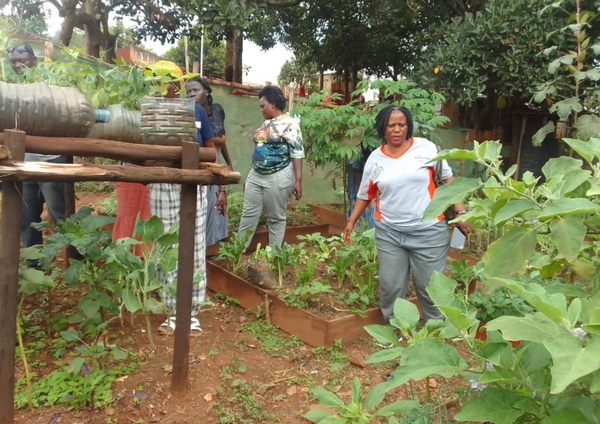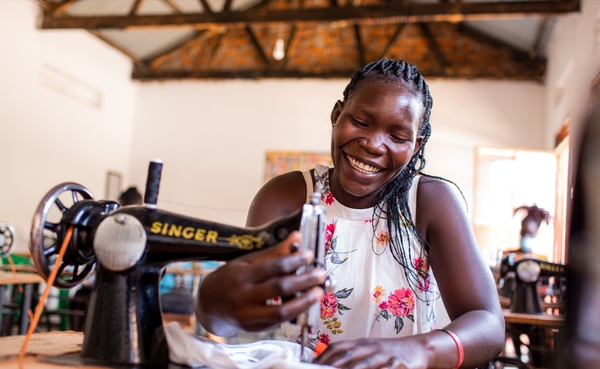- Who We Are
- How We Work
- Regional / Country Initiatives
- Legacy
- Core Themes
- Working Groups
- Portfolio & Results
- Newsroom
- Resources
Uganda: Strengthening Community Resilience to Climate Challenges

Project Overview
In response to the intersecting challenges of climate change, socio-economic shocks, health, and lack of municipal services, ACTogether Uganda, in collaboration with the National Slum Dwellers Federation of Uganda (NSDFU), is leading efforts to enhance resilience in Uganda's urban informal settlements.
The project aims to tackle climate change by ensuring access to vital information and fostering awareness and resilience through profiling and mapping risks and interventions, conducting media advocacy campaigns, and hosting radio programmes designed for the community and youth to engage a wider audience on inclusive development. Additionally, the project focuses on economic empowerment by providing peer-to-peer exchanges, vocational skills training, and business start-up kits. The goal is to strengthen resilience across 11 cities and municipalities.
This project is part of the Building Resilience in Informal Settlements Programme, a partnership between Cities Alliance and Slum Dwellers International (SDI), funded by the Swedish International Development Cooperation Agency (Sida), to support civil society organisations working in informal settlements.

Project Results: 2022-2024
The project has empowered communities in 11 cities by supporting 49 savings groups with 1,417 savers and 111 youth members. Over 100 participants have undergone vocational training, equipping them with essential skills for employment and entrepreneurship. This has led to tangible outcomes, with functional enterprises emerging in areas such as welding, catering, tailoring, and hairdressing. 13 Peer-to-peer exchanges with 178 people and financial literacy trainings have fostered entrepreneurship, particularly among women-led initiatives. Federation members now have access to vital financial resources at low interest rates, enabling them to address immediate needs and invest in their future.
59 settlements were profiled in 6 cities to update existing information about slum settlements, while a climate change profiling and mapping exercise was carried out to ascertain the geographical location and nature of existing climate change risk areas in slum communities in Jinja, Kampala, and Mbale City. 35 people were supported through training to address climate change and 68 people benefited from enhanced adaptive capacities to climate impacts.
The KYC TV initiative has successfully delivered extensive media production training to more than 42 youths, spanning from storyboarding to filming and editing to social media interaction. This has enabled them to effectively amplify community voices and advocate for their rights and needs.
Advocacy also included 39 settlement-level campaigns and information forums as well as 25 city- and national-level campaigns. Federation building was fostered in 52 leadership meetings.

Pro-Poor Data-Driven Development for Climate Resilience in Uganda
The Ugandan Alliance has played a crucial role in pro-poor, data-driven development by training young community members to collect and validate data on climate hotspots and settlement profiles across urban slum areas. By addressing the longstanding gap in locally relevant data, this initiative has empowered communities, fostered trust between residents and local authorities and enabled a bottom-up approach to development planning.
The collected data has directly influenced policy and service delivery, with city authorities now making informed decisions based on evidence rather than assumptions. The federation has also signed MOUs with urban authorities and local governments in 8 cities. That has significantly transformed the federation's ability to engage with local governments and urban authorities.
Notably, the grassroots-driven data was cited by local authorities in their official reports, showcasing its practical impact and credibility. Young people were also trained in modern data collection tools, enhancing their technical skills and sense of ownership. This initiative has strengthened community participation in urban planning, ensuring that slum dwellers are actively involved in shaping development strategies and climate adaptation measures.
Key Achievements: 2022-2024
- 49 savings groups and 1,417 savers supported
- 111 youth members mobilised and supported
- 35 people supported through networking and training to address climate change or to conserve biodiversity
- 68 people supported to better adapt to the effects of climate change
- 6 cities and 59 settlements profiled
- 39 settlement level information forums or campaigns
- 25 city or national level advocacy campaigns conducted
- 42 content creating initiatives involving youth
- 52 regional or national level federation leadership meetings were held
- 13 peer-to-peer learning exchanges with 178 individuals
